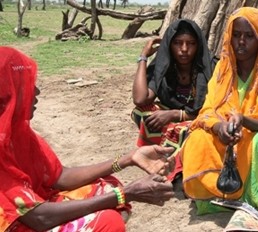afrol News, 9 April - The strongly harmful practice of female genital mutilation (FGM) is effectively being fought in Ethiopia's Afar region. Anti-FGM campaigns are supported by Muslim religious leaders, clan leaders and now even circumcisers themselves. 
A smile formed on Dohra Ali's face when she recalled what her eldest daughter asked her a couple of years ago. "Mother, is there a place in this world where FGM is not practised where I could go to?" At the time, the question came as an affront to Dohra, who was herself one of the women in the community who did the cutting.
Thinking back, Dohra says the words of her daughter were prophetic. A campaign to abandon female genital mutilation was begun in the region right about that time - in the year 2000. The campaign was mainly spearheaded by religious leaders, who worked tirelessly to inculcate an understanding among their more conservative counterparts, clan leaders and the community at large that the practice is not supported by Islam. This came as news to many, who had grown up with the idea that it was a religious requirement.
Dohra was fiercely opposed to the campaign at the beginning. However, she was persuaded later on when the religious leaders held discussions with her community and condemned the practice. Once she learned that it did not have the backing of Islam, Dohra resolved to spare her five daughters from the ordeal and to stop her own practice. Despite ridicule by some members of her community, Dohra went ahead and joined the anti-FGM campaign.
The campaign continued for six years, culminating in a conference in 2006 where consensus was reached to totally abandon FGM in the region, one year after the Ethiopian parliament had criminalised the practice. The conference involved government officials of the regional government and religious and clan leaders, but also the UN Population Fund (UNFPA).
The Afar region, one of the hottest and driest places on earth, ranks second in the prevalence of FGM in Ethiopia after the Somali Region, with prevalence rates of 74 and 92 percent, respectively, according to the Demographic and Health Survey conducted in 2005.
UNFPA joined local efforts in 2006, establishing an anti-FGM project. The core strategy of the programme was "to gain the support of an initial core group, which decides to abandon the practice and then helps mobilize a sufficient number of people to facilitate a tipping point – enough of a consensus to create a rapid social shift on the norm," according to the UN agency.
"Community dialogue was identified from the outset as a pivotal tool for mobilising community support," UNFPA adds. A local conference was held in 2009, where regional, district, and sub-district authorities took part and reached a unanimous agreement to support and facilitate community dialogue in their communities. They also pledged to play an exemplary role in their community by not mutilating their own children.
Administrators, clan and religious leaders and former circumcisers were given training, which covered FGM/C’s relationship to Islam, its effect on health, and the legal rights of women and children. Once trained, these "community dialogue facilitators" were entrusted with the task of disseminating information and knowledge among community members during the community dialogue sessions. Hundreds of such sessions have taken place.
"Despite the extensive system put in place to implement and monitor the programme, a few instances of parents continue to have their daughters cut have been uncovered," UNFPA reports. But the village anti-FGM committees diligently report these cases and the offenders receive punishment for violations. Still, reports had shown that some circumcisers who were brought to justice were released with a pardon, though there is no such provision.
Nevertheless, early indications had shown that the programme "is bearing impressive results," UNFPA says. According to Ato Asmelash Woldemariam, Executive Director of the Rohi Weddu Pastoralist Women Development, the number of uncircumcised girls in the six districts of intervention has reached 4,000. This is unprecedented in the region, where tradition holds that "an uncircumcised woman is one who is waiting for her day of circumcision or one who has already passed away," says Ato Asmelash.
It is expected that two of the intervention districts of the Afar project, Awash Fentale and Amibara, will declare themselves free of FGM this year, according to Ato Asmelash.
"If funding is secured, the programme will be scaled up to include three more districts," UNFPA says. "In the meantime, the emphasis is on consolidating the success already achieved, by adding elements such as income-generating activities and literacy training, mainly targeting former circumcisers," the UN agency announced.
By staff writer
© afrol News

 Journalists still locked away in Eritrea
Journalists still locked away in Eritrea
